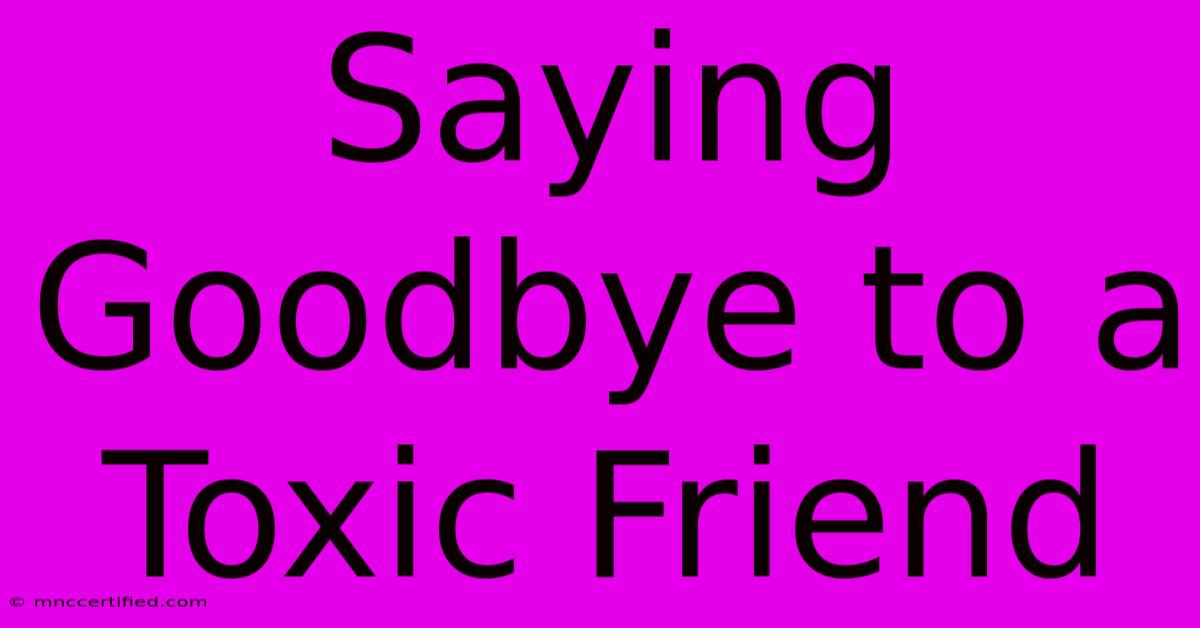Saying Goodbye To A Toxic Friend

Table of Contents
Saying Goodbye to a Toxic Friend: A Guide to Setting Healthy Boundaries
Ending a friendship, especially one that has become toxic, is never easy. It can evoke a range of emotions – guilt, sadness, anger, and even relief. However, prioritizing your mental and emotional well-being often requires making the difficult decision to distance yourself from a toxic relationship. This comprehensive guide will help you navigate this challenging process, offering strategies for recognizing toxicity, setting boundaries, and moving forward with grace and self-respect.
Recognizing the Signs of a Toxic Friendship
Before you can say goodbye, you need to clearly identify the toxic elements in the friendship. Not all difficult friendships are toxic; some require communication and compromise. However, consistent patterns of negativity or harmful behavior signal a toxic dynamic. Look for these warning signs:
- Constant Criticism and Belittling: Does your friend frequently put you down, make you feel inadequate, or criticize your choices? This can significantly impact your self-esteem.
- Manipulation and Control: Do they try to control your actions, decisions, or relationships? Do they guilt-trip you or use emotional blackmail?
- One-Sided Relationship: Do you feel like you're constantly giving and rarely receiving support or empathy? Healthy friendships involve reciprocity.
- Disrespect and Boundaries: Do they consistently disregard your boundaries or needs? Do they gossip about you or share your private information?
- Jealousy and Competition: Is your friend constantly competitive or jealous of your accomplishments? Healthy friendships celebrate each other's successes.
- Negativity and Draining Energy: Are they consistently negative, pessimistic, and draining your energy? Do you feel exhausted after spending time with them?
Setting Boundaries: The First Step to Saying Goodbye
Before completely severing ties, consider setting clear boundaries. This involves communicating your limits and expectations to your friend. This can sometimes salvage the friendship, but more realistically, it prepares you for a graceful exit if necessary.
- Limit Contact: Gradually reduce the frequency and duration of your interactions. This allows you to distance yourself without a sudden, potentially explosive confrontation.
- Direct Communication (Optional): For some, a direct but calm conversation is necessary. Express your feelings clearly and concisely, focusing on your needs and observations, not on blaming your friend. For example: "I've noticed that our interactions lately have been causing me stress. I need some space to prioritize my well-being."
- Avoid Justification: You don't owe your friend a lengthy explanation or justification for your decision. Keep your communication brief and firm.
- Be Prepared for Their Reaction: They might become defensive, angry, or try to manipulate you. Remain calm and reiterate your boundaries.
Saying Goodbye: Gracefully and Respectfully
If setting boundaries doesn't improve the situation, it's time to consider ending the friendship. While this can be painful, remember that prioritizing your well-being is crucial.
- Distance Yourself: Unfollow them on social media, limit contact, and avoid situations where you might encounter them.
- Limit Communication: Respond minimally if they attempt to contact you. You don't have to engage in lengthy discussions or debates.
- Focus on Self-Care: Engage in activities that nourish your mind, body, and spirit. Spend time with supportive friends and family.
- Seek Support: Talk to a therapist or counselor to process your emotions and develop healthy coping mechanisms. A support system is vital during this transition.
Moving Forward: Embracing Self-Love and Healthy Relationships
After ending a toxic friendship, focus on building a stronger sense of self and cultivating healthy relationships.
- Reflect on the Experience: Learn from the experience and identify patterns in your past relationships. What did you learn about yourself and your needs?
- Cultivate Self-Compassion: Be kind and understanding towards yourself. It's okay to feel sadness, anger, or guilt. Allow yourself to grieve the loss of the friendship.
- Focus on Positive Relationships: Surround yourself with supportive and uplifting people who value and respect you.
Saying goodbye to a toxic friend is a courageous act of self-preservation. Remember, your well-being is paramount. By following these steps, you can navigate this challenging process with grace and emerge stronger and more resilient. Prioritizing your mental health is not selfish; it's essential.

Thank you for visiting our website wich cover about Saying Goodbye To A Toxic Friend. We hope the information provided has been useful to you. Feel free to contact us if you have any questions or need further assistance. See you next time and dont miss to bookmark.
Featured Posts
-
Chess Champion Quits Event After Refusal
Dec 29, 2024
-
Ucla Beats Gonzaga Daileys Impact
Dec 29, 2024
-
Bengals Vs Broncos Watch Live
Dec 29, 2024
-
Golfer Scheffler Needs Christmas Surgery
Dec 29, 2024
-
Carlsens Jeans Chess Tournament Expulsion
Dec 29, 2024